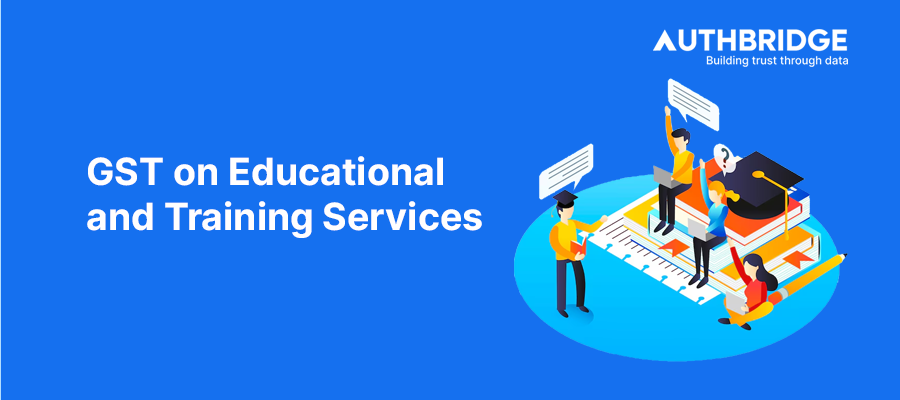GST On Educational & Training Services

GST's Impact on the Education Sector
The introduction of the Goods and Services Tax (GST) has brought significant changes to various sectors, including education. By streamlining the tax structure and providing clear guidelines, GST aims to ensure a uniform tax regime across India. This section will explore how GST affects educational and training services, highlighting the importance of understanding GST rates and compliance for educational institutions.
Overview of GST Rates for Educational Services
Educational services under GST have been categorized to ensure that essential education remains accessible. While many core educational services are exempt from GST, certain ancillary services are taxable. Understanding these distinctions is crucial for educational institutions to navigate GST compliance effectively.
GST Rates for Educational Services
General GST Rates for Educational Services
The GST framework categorizes educational services into exempt, taxable, and zero-rated supplies. Core educational services provided by institutions from pre-school to higher secondary levels, including part of higher education that leads to a qualification recognized by law, are exempt from GST.
Exemptions and Concessions in GST for Educational Services
Specific educational services, such as vocational training and skill development courses not leading to a formal qualification, may attract GST at the standard rate of 18%. However, services provided by the Indian Institutes of Management (IIMs) as part of their two-year full-time Post Graduate Programmes in Management, or five-year integrated degree programmes, are exempt from GST.
GST on Specific Educational Services
GST on Vocational Training and Coaching
Vocational training and coaching centers that offer courses leading to a certificate, diploma, or degree recognized by law are exempt from GST. However, coaching centers and institutions offering training programs not recognized by law are subject to GST at 18%.
GST on Higher Education Services
Higher education institutions, including private colleges and universities offering degrees recognized by law, are exempt from GST for their core educational services. However, ancillary services like accommodation, transportation, and food provided by these institutions may attract GST.
Compliance Requirements under GST for Educational Institutions
Mandatory GST Registration for Educational Institutions
Educational institutions providing taxable services with an annual turnover exceeding the threshold limit are required to register under GST. This section will detail the registration process, including the threshold limits and documentation required.
Filing GST Returns: Procedures and Deadlines
Registered educational institutions must file periodic GST returns, detailing their taxable supplies and tax paid. This part will outline the return filing requirements, including the types of returns, filing frequency, and deadlines.
Input Tax Credit (ITC) for Educational Institutions
Eligibility and Conditions for Claiming ITC
Educational institutions registered under GST can claim ITC on the GST paid on inputs and input services used for providing taxable educational services. This section will discuss the eligibility criteria and conditions for claiming ITC.
Process of Claiming ITC in the Education Sector
Claiming ITC involves maintaining proper invoices and documentation. This part will guide educational institutions through the process of claiming ITC, including the documentation required and the filing process.
Challenges and Solutions in GST Compliance for Educational Services
Common Compliance Issues and Their Resolutions
Educational institutions often face challenges in understanding GST rates applicable to various services, managing ITC claims, and adhering to filing deadlines. This section will address these challenges and offer solutions to help institutions manage GST compliance effectively.
Leveraging Technology for Efficient GST Management
Technology can play a crucial role in simplifying GST compliance for educational institutions. This part will explore how institutions can leverage technology, such as GST software and apps, to streamline tax calculations, filing, and record-keeping.
Conclusion
The Role of GST in the Education Sector's Growth
GST has played a significant role in structuring the tax regime for the education sector, promoting transparency and uniformity. Reflecting on the impact of GST, this section will discuss how it has facilitated the sector's growth and what educational institutions can do to ensure compliance and benefit from the GST regime.
Future Outlook for GST in Educational Services
As the GST framework continues to evolve, staying informed about regulatory changes and updates is crucial for educational institutions. The future outlook will focus on potential changes in GST regulations affecting educational services and the importance of continuous compliance.
Category

Abhinandan Banerjee
(Associate Manager - Marketing)
Abhinandan is a dynamic Product and Content Marketer, boasting over seven years of experience in crafting impactful marketing strategies across diverse environments. Known for his strategic insights, he propels digital growth and boosts brand visibility by transforming complex ideas into compelling content that inspires action.



